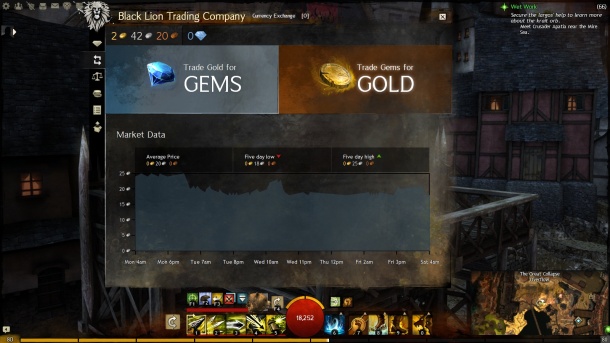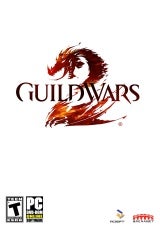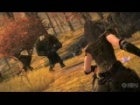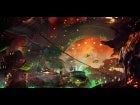
It wasn't until I'd played Guild Wars 2 that I realized how many other MMORPGs seemed intent on making me dislike other people. I hated the way I'd spend five minutes battling all the way to a named NPC for a quest, only to have some jackass swoop in while I was clearing the last two enemies and claim the kill for his own. I resented how people considered the numbers on my gear more important than my competence as a player in raids, and I loathed watching other players do their damndest to outrun me to resource nodes I approached. Things like this, I believe, contribute to the culture of petty vindictiveness in chat channels and forums that give the whole genre an inhospitable reputation, and that's why I'm happy to see that they're largely absent in ArenaNet's long-awaited creation. Guild Wars 2 instead places a heavy emphasis on cooperation rather than competition and skill over gear, and that alone does much to justify calling it a giant leap ahead for the genre.

Bear warriors living in Asian-style architecture. Familiar?
The Emperor's New Clothes
Classic kill-and-fetch quests are still here in abundance, for instance, but they're disguised.
It's worth noting that it achieves all this without ditching the well-worn conventions of the genre; instead, it takes the best elements pushes them forward. Classic kill-and-fetch quests are still here in abundance, for instance, but they're disguised as "hearts" that activate once you get in range, and each allows several different ways of completing the objectives, staving off monotony. Its dynamic events have roots in games like Warhammer Online, Rift, and even World of Warcraft, but they reach new heights of variety and significance here. A marauding pack of centaurs may overrun the garden where you were picking cabbages for a local farmer, compelling you to join in with dozens of other players and put an end to them, or a frightened fisherman may come running up to you asking for your help, only to lead you back to an ambush at a bandit camp. Even better, many of these events are chains, and by leading you on epic quests across Guild Wars 2's zones they inject life into areas that would be dead in other MMORPGs. It's important to note that they're scripted events that eventually repeat (and are not, as some players assume, completely random events,) but they have thus far never failed to ensure that Tyria feels like a living world.
And sometimes dynamic events end in sights like this. What's not to love?
I've found teleportation to be a nice touch that can bring dozens of players running to one location for a dynamic event.
Coming from other fantasy MMORPGs, it may seem jarring that there are no mounts in Tyria, but then there is no need for them. As it stands, Tyria is dotted with more than 500 waypoints that you can teleport to within seconds for a tiny fee as long as you've already discovered them. In theory this fast travel would hamper immersion, and that'd hold true if you're seeking a realistic fantasy world to play in; in practice in Guild Wars 2, I've found teleportation to be a nice touch that can bring dozens of players running to one location for a dynamic event through a simple call for help in the local channel. It especially proves beneficial if you're struggling to find more hearts at your level in a zone, as you can quickly 'port to another zone for your level bracket with ones you haven't finished.Storming the Gates
I'm loving the PvE quests, but it's in its PvP that Guild Wars 2 shines the brightest. Most notably, it's the world-versus-world battles that match three different servers against each other in a massive battlefield that's as large as a couple of zones in Tyria proper and crammed with keeps, towers, and supply posts ripe for the taking. It's one of the closest approximations of medieval combat I've ever seen in an MMORPG, complete with the need to work together to build siege engines such as trebuchets and battering rams in order to knock down the doors of castles. It's so popular at the moment that most servers suffer from queues for entry.
The concept is great in theory, and it's wonderful when sides are fairly balanced and there's a tug-of war between objectives, but that's not always the case in practice. ArenaNet is still working out the kinks of matching servers to prevent one server from consistently steamrolling to victory (which is important since victory awards server-wide bonuses), and that, with some qualifications, victory seems to go groups who can amass a large army of players to swarm objectives. Yet that's not a problem in the structured PvP battlegrounds, which resemble the battlegrounds of World of Warcraft except that every player enters on even footing, temporarily promoted to level 80 with a preset sampling of skills and gear. The four maps are refreshing, filled as they are with claustrophobic corridors rather than open expanses, but I found myself wishing some involved more than the same goal of capturing and holding points. If you're looking for the latest innovative variation on capture-point gameplay, you won't find it here.

This turned out about as well as Stannis' offensive in the Battle of Blackwater.
Difficulty gets to the point that dungeons can intimidate and frustrate new players when they first start popping up at level 30.
As welcoming as the masterful PvP is for new players, the eight dungeons are punishing, deadly affairs that spit on the notion that they should be cakewalks for loot. It's been hard, almost like being in an abusive relationship, but I've grown to love them. Their uniqueness mainly springs from ArenaNet's gutsy call of tossing the comfortable class-based trinity of tanks, healers, and damage dealers off the parapet and to give each class potential competency in each specialization. A visceral realism lingers throughout, as enemies don't always focus all their attention on the most armored guy in the room and ignore the softies in robes standing around. These are intense fights designed to keep your eyes on the action, complete with devastating area-of-effect spells and non-boss enemies that can down even plate-wearers in two or three hits. Difficulty gets to the point that dungeons can intimidate and frustrate new players when they first start popping up at level 30. With experience and time, though, they become more rewarding once you realize that you need to relearn everything you've previously known about running a dungeon. Wandering in with the same abilities you use for PvP isn't going to cut it. Complexity in Simplicity
Part of my learning to survive and thrive in dungeons was learning to appreciate the complexity of Guild Wars 2's combat system. The action bars themselves initially might seem sparse to players used to the 30 or so skill slots plastered on the interface of a game like Lord of the Rings Online, limited as they are to five skills specific to each weapon and five secondary skills. This system's complexity only becomes apparent once you learn the synergies of specific weapon combos and switching out between two of them in combat.
It's a setup that champions using abilities at the proper moment rather than falling into snoozefest rotation schemes, which works well with the gameplay's unceasing emphasis on movement. In PvE as well as PvP, sitting still usually ends in death. In the dungeons, the challenges force you to learn how to use abilities you may have never thought of using in the world proper. Your secondary abilities (such as rooting skills, healing abilities, and the like) take on a special significance here, particularly since you can switch them out on your action bars to suit the demands of the situations.

With patience, you can eventually unlock every skill.
The simple "face off" design of the cinematics lacks the richness of the scenes we saw In Star Wars: The Old Republic.
If you do, you'll be treated to storylines that have their highs, such as an unforgettable quest I went on to retake an island outpost from the undead hordes of Orr, and their lows, like enduring boring cinematics with a supposedly great Sylvari leader whose appearances inspire about as much confidence as handing over the controls of a fighter jet to a kitten. Voice acting is dull for some characters but wonderful for others (such as actress Felicia Day's interpretation of the Asura heroine Zojja), and the simple "face off" design of the cinematics lacks the richness of the scenes we saw In Star Wars: The Old Republic. Race also seems to play a part in the quality of the story, so you can expect more humorous events with the diminutive and supercilious Asura than you will with the dour Norns.Here There Be Dragons (Of Course)
But even though the storylines have their ups and downs, the lore itself is one of the richest and most fascinating I've encountered in an MMORPG. Tyria feels like a real world, revealing the fruits of seven years of the first game's lore development to build on. It's surprising how well ArenaNet works it into the hearts and dynamic events, allowing players to catch on to what's happening if we pay the least bit of attention. Some of the hearts manage to instill strong feelings -- I, for instance, could never feel comfortable helping the cat-like Charr drive out the once-human ghosts who still fight over the dead kingdom of Ascalon, which the Charr destroyed and took over 300 years before. As a Norn, I found myself angered that the evil Sons of Svanir have their own enclave in the Norn capital of Hoelbrak after all the hell I'd been through fighting them in the frozen wastes of the Shiverpeaks.

Tyria's lore even manages to make holes in the ground interesting.
Raiding on Demand
Endgame at this stage hinges on a heightened version of the leveling content.
Yet all this means that PvE players whose primary enjoyment of MMORPGs springs from neatly organized raids and traditional gear progression may find the endgame lacking, and if they move too quickly to the level cap, they'll find themselves burned out and asking for more. Endgame at this stage hinges on a heightened version of the leveling content, whether it be the PvP options, tackling the even-harder difficulties of the eight dungeons, or participating in dynamic events of the ruined island of Orr. Orr itself is a looming though promising question mark, as many players still haven't reached the level cap in order to participate in the level 80 zone of the Cursed Shore. The dynamic content is built for groups of 10 to 25 players, and while that may sound as familiar as a World of Warcraft raid, the difference is that these events take place in the open world and you can jump into them at any time. Raiding -- as it's known to players of Rift, Star Wars: The Old Republic, and WoW -- doesn't exist here; the closest you'll get are world bosses with similar mechanics to the greatest hits of other MMORPGs, but in an open-world setting. It's yet another way that Guild Wars 2 emphasizes community over elitist exclusion, although some of the content's currently too buggy and players are too few for me to see how this approach will suffice for a PvE endgame in the long run. With Guild Wars 2's buy-to-play model, however, you're free to pop in as your please without the obligations of a subscription.

All this just to unlock a dungeon waypoint.
The shortsightedness of ArenaNet's omission of a dungeon finder is starting to become apparent.
Even so, the items are on the expensive side, with bank expansions notably costing 600 gems (or $8). The good news is that you can get almost everything else in the store from the world itself by completing daily achievement quests and other activities. Normal crafting materials and gear, on the other hand, are bought through the game-wide Trading Post, although it's been down for most of Guild Wars 2's time as a live game thus far, presumably due to the "good" problem of server overload. The shortsightedness of ArenaNet's omission of a dungeon finder, however, is starting to become apparent. The absence of that essential tool seems all the more strange in a world that lets you flit between zones faster than you can type "LFG." 
That's one way to fight the gold farmers, I suppose.
One of GW2's greatest contributions to MMOs is the fact that it has no subscription, and only a few microtransactions. I'm not pressured to play a ton (and thus burn through all the available content quickly). But without that pressure to play to get their money's worth, will players stick around? How long do you think you'll play?
Want to see how we got here? Read the review in progress on the following pages.





 Outstanding!
Outstanding!


